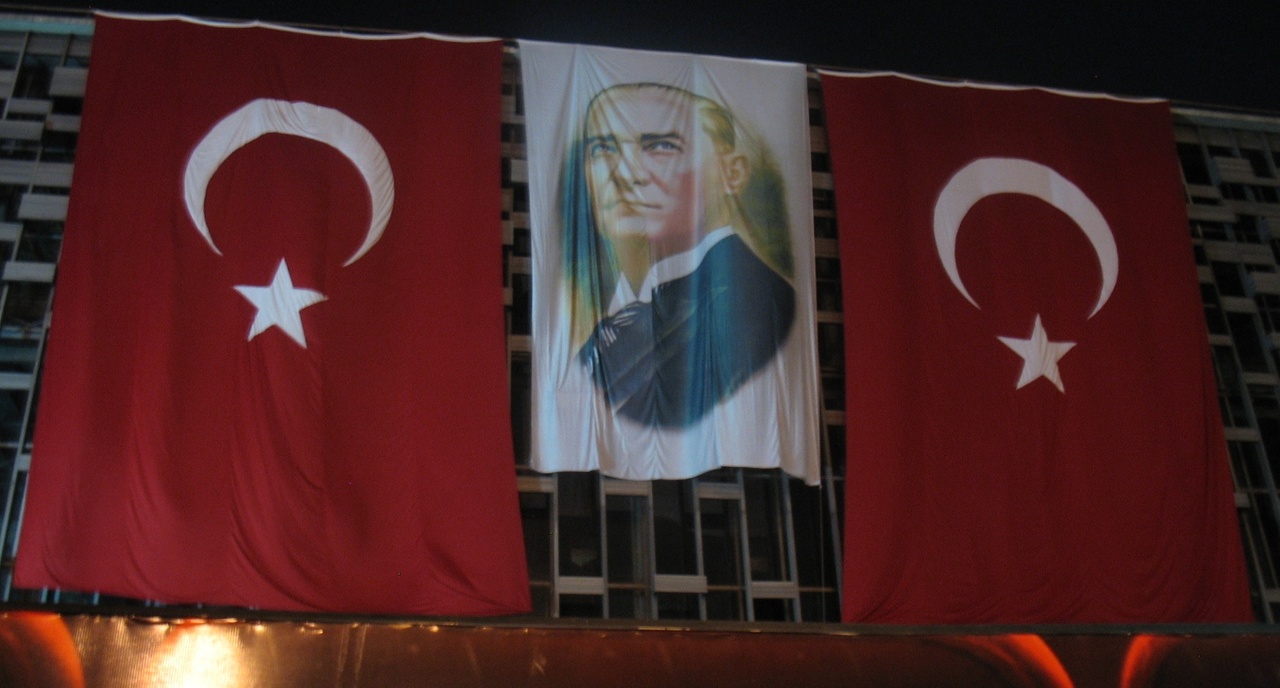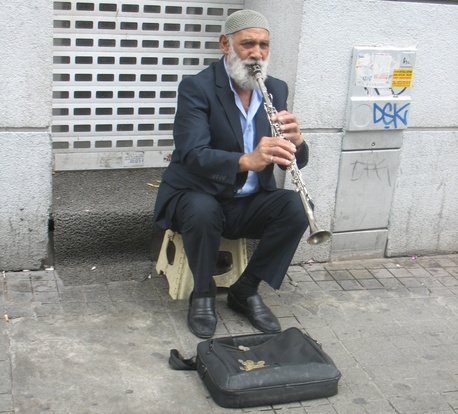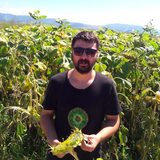In our last day, we met
Batikan Manço, one of
Bariș Manço’s sons (he had two sons; the other one is a
DJ and dance music producer. We had a long and pleasant conversation at Starbucks about music, about Turkish habits, and, of course, about his father
Bariș Manço, one of the most loved people in Turkey. Batikan works in Istanbul at a company involved in the production of library music. He has to cross the entire town everyday, from the Asian part to the European part, and back, in order to get to work and back home. He stayed in Florida for a few good years, after his father died. He returned to Turkey a couple of years ago. ‘’When you’re a tourist, Istanbul seems much fun. When I look back I realize that I lived and studied in three different countries. I was born in Belgium, 9 years in the United States and the rest in here. But for me, Istanbul it’s really tiring.’’
‘’We always had that pressure of being
Bariș Manço’s sons; since our birth, maybe. I suppose the family of Michael Jackson suffers the same things I suffer. We were known everywhere, and after my father passed away that doubled and tripled. That’s why we went to US when we were young, in 2001. His fans love us too. Bariș Manço was not just a singer, but also a TV host; he was a people’s person, a symbol. His songs can go for any kind of people.''
''Every January and February we have commemorative events, because in January was his birthday and February the month when he past away. During those times, it’s just crazy. If you ask me about memories, the only things I can tell you it’s the vacation times. He would travel to one continent for about a month, just go to country to country to country, for his TV show, and then he would come back and do the editing, the montage and anything by himself. I could see him rarely. He always had to do something. If he didn’t do any composing or editing for the TV show, he would just…clean the antiques from his collection.’’
I ask Batikan about the music in their house, when he was a child. ‘’I remember that I used to listen to my father since I was 2 or 3 years old. My father loved classical music,
Beethoven,
Mozart,
Vivaldi; he had a big collection on CDs - he loved the new technology, with CDs and stuff like this. I loved movie soundtracks; it helped me think differently. Then I started to listen to new age music, rock music. I don’t like Turkish pop of the past 15 years. I don’t like any way of arabesque music. They are so emotional, in a sad way. Most of the lyrics of folk music or arabesque music are about loss or a sad love. It’s always sad. Of course, I listen to my father’s music as well. I feel that I have to, because there are some songs that still I don’t fully understand. Some lyrics seem cryptic to me; the meaning of the words is so heavy that actually I can come up with ten different answers to what he says. That’s the thing with
Bariș Manço’s songs. He says something, you can understand it in one way, I can understand it in a different way.’’
Bariș Manço's generation of musicians they were all friends, since the beginning. They started something new in Turkish music. ‘’I remember seeing a couple of times
Sezen Aksu in our house, I’ve seen
Cem Karaca, from
Mogollar. I don’t know if
Erkin Koray and my father really liked each other, because, they were almost in the same kind of music, but Erkin Koray style was more psychedelic. And his lyrics were sometimes strong, so not many people would say that they really liked it. He was more rebellious in his time, which made him unique, of course. In the ‘70s, things weren’t that simple in Turkey.
Erkin Koray must had some courage to have an album with him being nude and just holding a guitar in front of his private. Back then, this was very controversial. As for
Cem Karaca, not many people would like him as well, because most of his lyrics were political. Many of the musicians, including my father, suffered from censorship. Cem Karaca has gotten into some political ideas; back then there was the left and right sides. He was so strong about it, that he got exiled to Germany for about ten years or so. Later on, he returned, after all the political stuff stopped, but for him was too strong. His lyrics were actually speaking the truth. When I listen to his songs today, they can’t really synchronize into today’s Turkey. It seemed that Turkey had never changed for the past 40 years.
Mogollar were in their own style, they didn’t go into any direction, they were fine on their own. And then, they didn’t disband, but they stopped at some point. But my father kept going.’’
In the 80s television came to Turkey, CDs came to Turkey, and a big change has happened. ‘’My father started to work in television and his style of music changed, after me and my brother were born. Because in his music of the 70s, the music was psychedelic as well, because he did it with instruments and synthesizers that he brought from Europe. Back then, there weren’t this kind of instruments in Turkey. His lyrics were cryptic and deep. And then he got married, we were born, and you could see in his music that instruments changed, the style changed, he has become more like a public figure. He started to go for all ages, musically. That’s what made him more popular.’’
After high school,
Bariș Manço went to Belgium to study the Academy of Fine Arts. He used to sing as well, but in the weekends, to earn some money. ‘’My uncle told me that Bariș was singing at cafes from Brussels and Liege. He started his professional music career in Belgium, with a band called Les Mystic Rive, they were all Belgium and they had their first record. His style was like American rock and roll of the 60s. He looked like early
Elvis Presley. He had short hair, no moustache, nothing. And then, some of his songs were like covers of American rock and roll. Then, he came back to Turkey and he tried that style inhere, but it was difficult for the people to understand. Back then, the music was either traditional, folk or even arabesque, maybe. Then he changed his style; he wrote
Dağlar Dağlar. That was his first breakthrough. It was very emotional, very deep; it is a song of sadness and homesickness and that’s where he hit the hearts of many people.’’
In all his career, it was always
Bariș Manço and somebody. He was never included in one band or in any other way; it was always like this. ‘’In the mid’ 70s he formed
Kurtalan Ekspres, a Turkish Anatolian rock band. That band had so many formations; many people came and left that band. Until today, the band changed its members 14 or 15 times.’’
‘’In
Istanbul, we had two houses, both on the Asian sides. One of them is now a museum. That’s where he composed most of his songs. Whenever he was thinking of something, he was writing notes in an agenda, which he was always carry it with him. In one interview he spoke of how he composed some lyrics. Sometimes I used to see him compose at home, but that was rare, because I think he preferred to be alone when he was composing, writing. Some of his lyrics are also proverbs from the Turkish literature. You think you understand it, but you also know that is so deep.’’
--
AUDIO BONUS: Hello? This is Turkish Music mixtape




